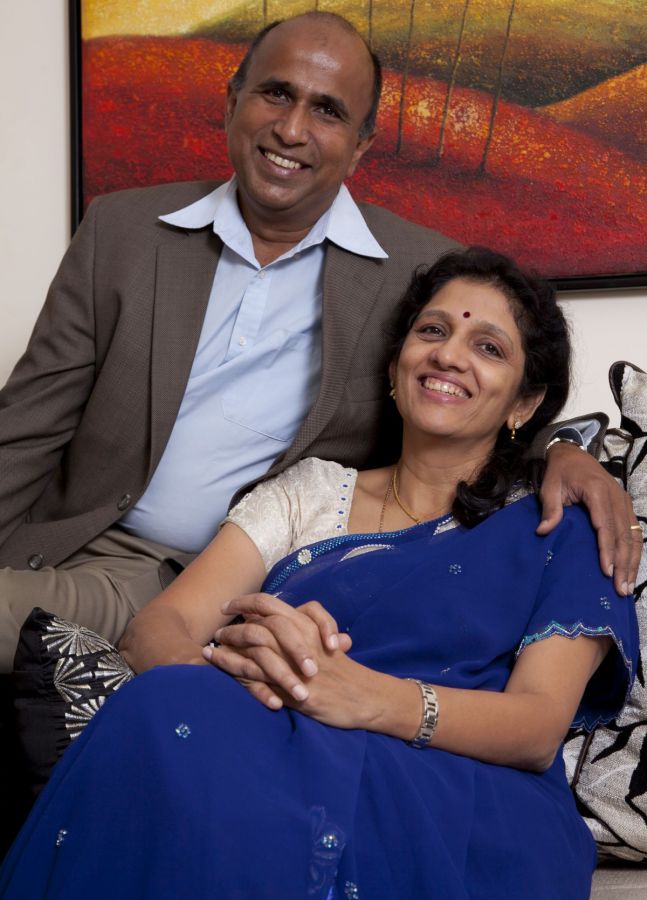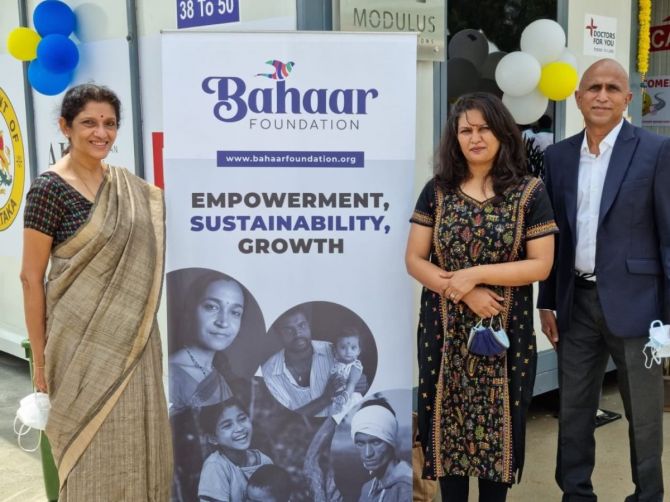'We look at the opportunities that are going to come in various fields in the next 5 to 10 years, do some research and come up with business plans.'
'Then, we go and seek out founders who will run the actual business.'

He is one of IIM-Calcutta's best-known entrepreneurs. The story is that his first visiting card only read, 'from IIM Calcutta'.
Krishnan Ganesh is one of India's most successful serial entrepreneurs, whose name is synonymous with TutorVista, Big Basket, Bluestone.com, etc.
After his stint as a serial entrepreneur building four successful ventures, he founded GrowthStory.in, a venture builder platform.
"I don't think I will be a good venture capitalist. I wanted a more direct hands-on action. I wanted to be the operator in a start-up," Ganesh tells Rediff.com's Shobha Warrier.
The first of a two-part interview:
From being a serial entrepreneur, why did you decide to start Growthstory.in that incubates and promotes new ventures and entrepreneurs?
I started my entrepreneurship journey in 1990 way before entrepreneurship or venture capital investment had become popular.
There was no concept of new generation entrepreneurs or even service businesses then. The only concept of business was manufacturing.
That was when I started my first business, IT&T and sold later to iGate.
In 2000 I started my second business venture, Customer Asset, which was India's first BPO/call centre now publicly listed as First Source Solutions.
In 2003, I started Marketics, a data analytics BPO.
In 2005, I started Tutorvista and exited in 2011 after it was acquired by Pearson.
At that time, I had turned 50 and had already done four greenfield serial ventures, and was slightly tired of it.
It made me think, what should I do when I am 50-60?
That was also the time when India's start-up ecosystem and entrepreneur ecosystem was ready to take off.
After starting four ventures and having exited all the four, I thought of a new idea which was not an incubator, and I was not an investor or a venture capitalist.
We call it parallel entrepreneurship, or venture builder model. This is a very unique model. The only global parallel is the Germany-based Rocket Internet.
This company model is known as start-up studio or a venture builder.
What is a venture builder, and how is it different from a venture capitalist?
What we do is, we look at the opportunities that are going to come in various fields in the next 5 to 10 years, do some research and come up with business plans.
Then, we go and seek out founders who will run the actual business.
The difference is, in the accelerator-incubator model, people go to people with your idea for mentorship, space and funding.
That is, you go to VCs and pitch your idea for funding.
In our model, it is the reverse. For example, if we feel the opportunity is in digital media, we do some research and if I see that entertainment in digital media is a good business, I write a business plan.
My next step is to find the best founders for this idea.

Do you look for established entrepreneurs or fresh people?
It could be fresh, it could be established. But we are the ones who go and seek them out.
We tell them, 'This is the plan we have. Why don't you come as a founder and run the business?'
My home will be the first registered office, and I write the first cheque. I don't call myself the investor; I am the promoter, and the first money comes from me.
It means the founder doesn't have to look for an office and raise money on his own.
After some time, if the idea works out, I go and raise money from institutional venture capitalists.
Then, it becomes the proper organised institutional venture-funded company.
So, the basic model is, I write the initiate business plan, I seek out the founders and I promote the business.
If I founded and ran my first four businesses as the CEO, in this model the founders I seek out run the business. I don't.
Yes, it is my baby as much as the founder's.

Your first big success story was Big Basket...
Yes, the first business we started in this model was Big Basket. It is the first growth story in the venture builder model business.
The founders of Big Basket were the people I worked with in Fabmart. We had done online grocery business in Fabmart way back in 2011 when nobody wanted to buy groceries online.
I thought e-grocery is the mother of all in retail category, but there was no one in there. It was not something Amazon or Flipkart could do easily. It is a vertical.
How I managed to raise the initial money from Ascent Capital is an interesting story.
I had approached 20 venture capitalists with the idea, but all of them said, no.
They were of the opinion that Indians would never buy grocery online as they are used to the touch and feel of vegetables while buying.
I asked my mother and she also said, she would never buy groceries online, and that she had to pick each vegetable carefully.
Another thing was, if you do a case study of e-grocery, one of the biggest stories of the dotcom era was the massive failure of Webvan that went bankrupt in 2001 after three years of operation.
A fortunate thing happened when I was on a flight from Mumbai to Bangalore. Sitting next to me was Raja Kumar, the founder and CEO of Ascent Capital.
Because of bad weather, we were asked not to move from the seats throughout the flight.
Making use of this opportunity, I opened my laptop, and pitched him the e-grocery idea.
By the time we landed at Bangalore, he had said yes to the idea.
Of all the VCs I had met, he was the only person who found the idea viable.
Ascent Capital was a private equity fund and not a venture capitalist. Yet, he was ready to invest in the idea. And it was the first time they had done a tech investment.
It was their first e-commerce investment. It was their first time for an institutional investment.
It was their first time investment as a venture capitalist.
The rest is history!
Big Basket was followed by Bluestone.com, an online jewellery company; Portea Medical, a home healthcare company with over 4,000 employees across 37 cities; HomeLane, an end-to-end interior design and manufacturing provider.
If these four are huge successes, there are failures also. We had to shut down six initiatives which didn't work.
This is my 50s to the 60s journey.
Many serial entrepreneurs turn mentors and venture capitalists after their entrepreneurial journey. Why did you opt for the venture builder model?
You have to have a completely different skill-set to be a venture capitalist. It is a great business where you need a different mindset.
The VCs raise money and use in multiple businesses.
I don't think I will be a good venture capitalist. I wanted a more direct hands-on action. I wanted to be the operator in a start-up.
I am addicted to entrepreneurship. I get a high in this. So, I didn't want to completely relinquish the idea of entrepreneurship.
- Part 2 of the Interview: 'Entrepreneurship is a marathon'
Feature Presentation: Aslam Hunani/Rediff.com











